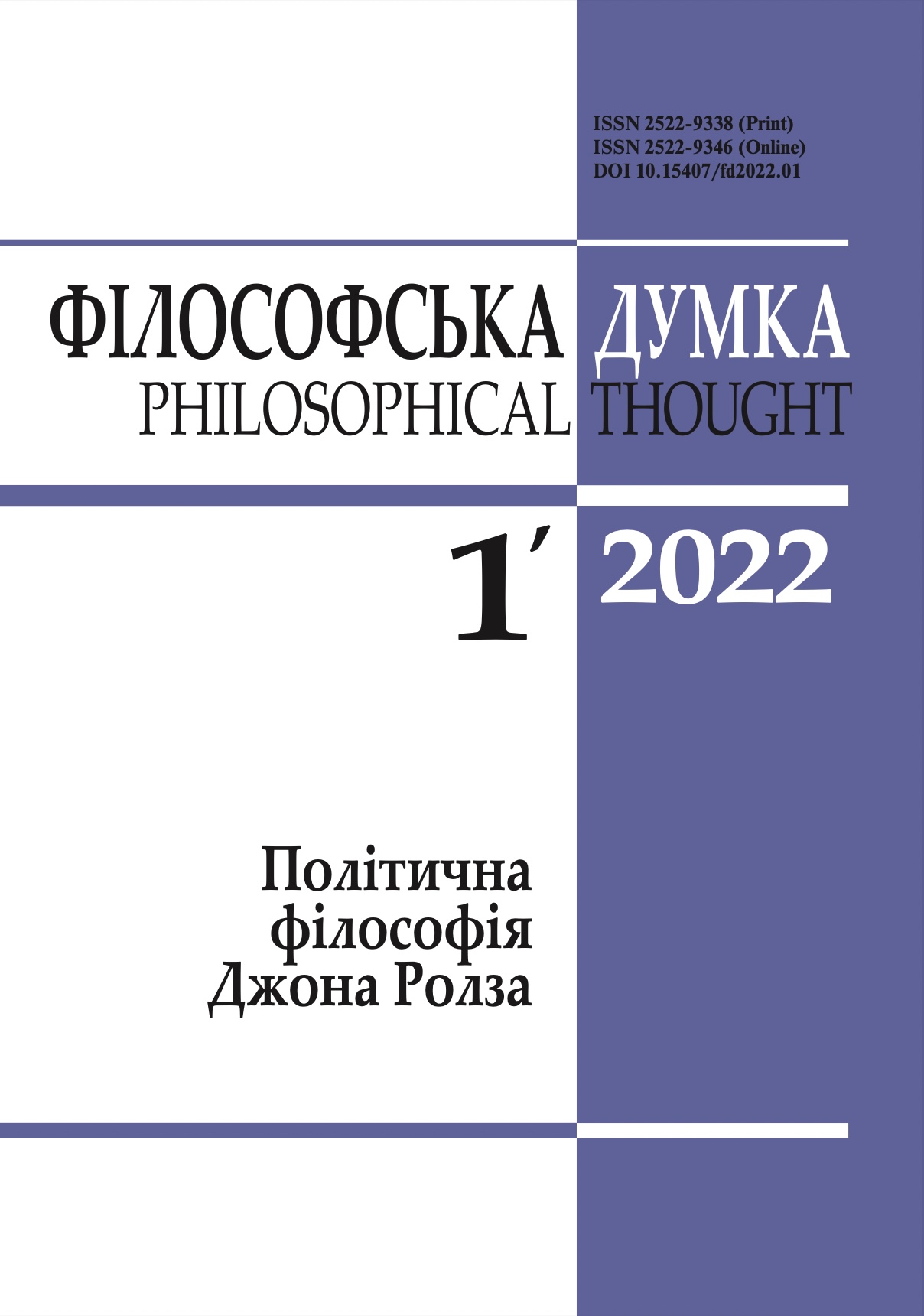ON THE WAY TO EXPANSIVE POLITICAL LIBERALISM: MARTHA NUSSBAUM’S CAPABILITY APPROACH AS A REINTERPRETATION OF THE IDEAS OF YOUNG JOHN RAWLS
Young scientist’s page
DOI:
https://doi.org/10.15407/fd2022.01.068Keywords:
background culture, political conception, constructive ethical pragmatism, capability theory, public reasonAbstract
The ideas of later Rawls (after 1993) and particularly his early period of work (before the 70s of the 20th century), often become the subject of serious attention. In the author’s view, this situation establishes stereotypical and one-sided interpretations. However, objective attention to Rawls’ ideas of the early period (the project of naturalist ethics based on the protestant basis, objective morality, which constitutes itself through the fact of perception of others as human beings, robust definition of human nature) and later («political conception», «background culture», «public reason») period of work let us substantively enrich the field of interpretation in contemporary political philosophy.
The aim of this article is triple: to prove (1) that Martha Nussbaum’s critique of later John Rawls, proposed within capabilities approach, is not exhaustive; (2) that this critique will arise as more fruitful if it will use several early ideas of Rawls, which he later stopped using; (3) that such an overlap of arguments creates a new version of political liberalism, more consistent than later Rawls’ version and Nussbaum’s.
The author proposes to name this version with the term «expansive (the one, which can ex- pand) political liberalism» (hereafter EPL). The important components of EPL are the idea of Henry Richardson about the complementarity of «good» and «right», a thesis about the necessity of civic education, and also the interpretation of capabilities approach within «reasonable comprehensive doctrines». Based on these components, the author describes the mechanism of impact on the «background culture», from which the «public reason» emerges, which will define Rawls’ «political conception». Accordingly, the «political conception» can expand within EPL. Because of the complementarity of «good» and «right», it gains the ability to respond better to the political challenges, while maintaining the inviolability of fundamental political principles of society.
References
Andersen, L.R., Bj rkman, T. (2021). Bildung. The Nordic Secret of Beauty and Freedom. [In Uk- rainian]. Kyiv: Nash Format.
Baehr, A.R. (2013). Liberal feminism: Comprehensive and Political. In: Abbey, R. (Ed.), Feminist Interpretations of John Rawls (pp. 150-166). University Park: Pennsylvania State University Press.
https://doi.org/10.5325/j.ctt32b9dp.13
Bok, P. (2017). To the Mountaintop Again: The Early Rawls and Post-Protestant Ethics in Postwar America. Modern Intellectual history, 14(1), 153-185. https://doi.org/10.1017/ S1479244315000268
https://doi.org/10.1017/S1479244315000268
Deneulin, S., Zampini-Davies, A. (2020). Religion and the Capability Approach. In: E. Chiap- pero-Martinetti, S. Osmani, M. Qizilbash (Eds.), The Cambridge Handbook of the Capability Approach (pp. 686-705). Cambridge: Cambridge University Press.
https://doi.org/10.1017/9781316335741.039
Depraz, N. (2011). Animal. In: B. Cassin et al. (Eds.), European Dictionary of Philosophies: Lexicon of intransitives. Vol. 2 (pp. 402-406). [In Ukrainian]. Кyiv: Duh i litera.
Galisanka, A. (2019). John Rawls: The Path to A Theory of Justice. Cambridge, MA: Harvard University Press.
https://doi.org/10.4159/9780674239463
Kallhoff, A. (Ed.). (2001). Martha C. Nussbaum: Ethics and Political Philosophy. Münster: Lit.
Khader, S. (2018). Should the capability approach be paternalistic? In K. Grill, J. Hanna (Eds.), The Routledge Handbook of the Philosophy of Paternalism (pp. 206-219). Abingdon: Routledge.
https://doi.org/10.4324/9781315657080-18
Khoma, V. (2021). The History of Philosophy and the Practical Philosophy in Martha Nussbaum's New Book. Nussbaum, M. (2019). The Cosmopolitan Tradition: A Noble But Flawed Ideal. Cambridge, MA: Harvard University Press. [In Ukrainian]. Sententiae, 40(3), 129-133. https://doi.org/10.31649/sent40.03.129
https://doi.org/10.31649/sent40.03.129
Mandle, J., Reidy, D. (Eds.). (2014). The Cambridge Rawls Lexicon. Cambridge: Cambridge Uni- versity Press.
https://doi.org/10.1017/CBO9781139026741
Nussbaum, M. (2000). Women and Human Development: The Capabilities Approach. New York: Cambridge University Press.
https://doi.org/10.1017/CBO9780511841286
Nussbaum, M. (2006). Frontiers of Justice: Disability, Nationality, Species Membership. Cambridge, MA: Harvard University Press.
https://doi.org/10.2307/j.ctv1c7zftw
Nussbaum, M. (2011). Creating Capabilities: The Human Development Approach. Cambridge, MA: Harvard University Press.
https://doi.org/10.4159/harvard.9780674061200
Nussbaum, M. (2019). The Cosmopolitan Tradition: A Noble But Flawed Ideal. Cambridge, MA: Harvard University Press.
https://doi.org/10.4159/9780674242975
Pogge, T. (2007). John Rawls. His Life and the Theory of Justice. (M. Kosch, Transl.). Oxford: Oxford University Press.
https://doi.org/10.1093/acprof:oso/9780195136364.001.0001
Rawls, J. (1999a). A Theory of Justice. Cambridge, MA: Harvard University Press.
Rawls, J. (1999b). Collected Papers. Cambridge, MA: Harvard University Press.
Rawls, J. (2005). Political liberalism. New York: Columbia University Press.
Rawls, J. (2009). On my religion. In: T. Nagel, J. Cohen, R. M. Adams (Eds.), A Brief Inquiry into the Meaning of Sin & Faith (pp. 259-270). Cambridge, MA: Harvard University Press. Richardson, H. (1995). Beyond Good and Right: Toward a Constructive Ethical Pragmatism.
https://doi.org/10.4159/9780674054486
Philosophy & Public Affairs, 24(2), 108-141. www.jstor.org/stable/2265390
Richardson, H. (2018). Articulating the Moral Community: Toward a Constructive Ethical Pragmatism. New York: Oxford University Press.
Downloads
-
PDF (Українська)
Downloads: 581
Published
How to Cite
Issue
Section
License
Authors who publish with this journal agree to the following terms:
- Authors retain copyright and grant the journal right of first publication.
- Authors are able to enter into separate, additional contractual arrangements for the non-exclusive distribution of the journal's published version of the work (e.g., post it to an institutional repository or publish it in a book), with an acknowledgement of its initial publication in this journal.
- Authors are permitted and encouraged to post their work online (e.g., in institutional repositories or on their website) prior to and during the submission process, as it can lead to productive exchanges, as well as earlier and greater citation of published work (See The Effect of Open Access).


